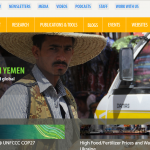Uncertainties include lingering high domestic food prices in many countries. Read Blog post > https://www.ifpri.org/blog/food-export-restrictions-have-eased-russia-ukraine-war-continues-concerns-remain-key Image: Indonesian man w/wheelbarrow filled... Source: IFPRI Bangladesh Country Office
Food price shocks and diets among poor households in Egypt
Because of its dependence on food imports, Egypt is particularly vulnerable to the high world food prices and trade shocks triggered by Russia’s February 2022 invasion of Ukraine. Imports account for more than 40% of Egypt’s calorie consumption, and th... Source: IFPRI Egypt Country Office
Addressing the food crisis in Yemen: The private sector’s key role amid local conflict and global market disruptions from the Russia-Ukraine war
The Yemen conflict, underway since early 2015, has led to an ongoing, unprecedented humanitarian emergency. Food needs far exceed current consumption levels, with 3.5 million pregnant or breastfeeding women and children under 5 suffering from acute mal... Source: IFPRI Egypt Country Office
The Russian Invasion of Ukraine Threatens to Further Exacerbate the Food Insecurity Emergency in Yemen
The Russia-Ukraine conflict has roiled agricultural markets, particularly wheat, which has seen prices rise by 30% since Russia invaded on Feb. 24. This post focuses on the impacts of the crisis on Yemen, whose poverty, civil war, and dependence on whe... Source: IFPRI Egypt Country Office
How will Russia’s invasion of Ukraine affect global food security?
Conflict is a key driver of food insecurity, potential supply disruptions and price spikes.
The post How will Russia’s invasion of Ukraine affect global food security? appeared first on IFPRI South Asia Office.
Source: IFPRI South Asia Office



